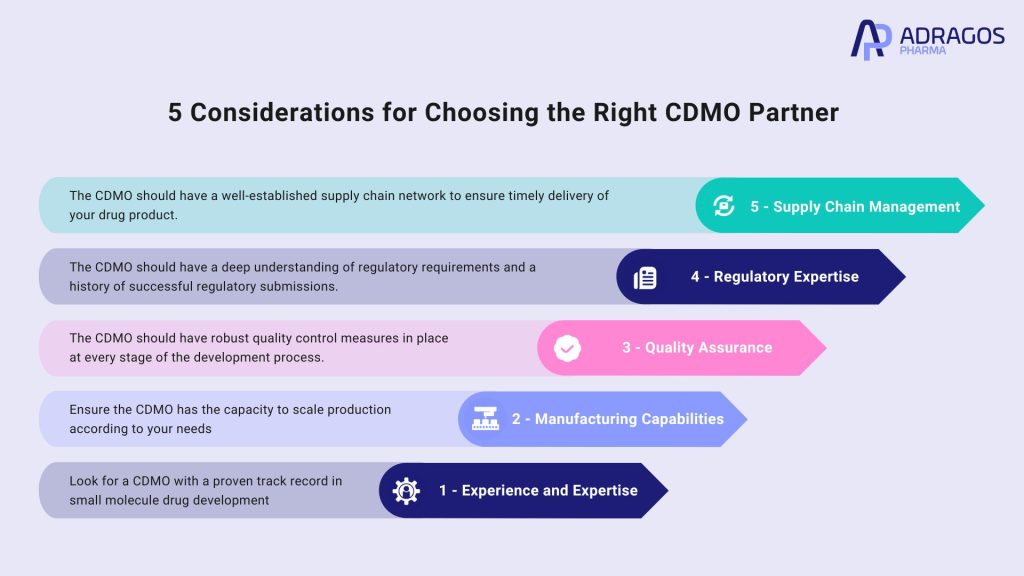Small molecule drugs have been the cornerstone of the pharmaceutical industry for decades. Drug discovery plays a crucial role in the development of these small molecule drugs, involving intricate stages and innovative technologies to create effective therapies. These chemically synthesized compounds have revolutionized medicine by providing effective treatments for a wide range of diseases. Whether you are a seasoned pharmaceutical professional or new to the field, understanding small molecule drugs and the role of Contract Development and Manufacturing Organizations (CDMOs) in their development and production is crucial. This comprehensive guide will explore everything you need to know about small molecule drugs, from their definition and applications to choosing the right CDMO partner for your projects.
What Are Small Molecule Drugs?
Small molecule drugs are low molecular weight organic compounds that can easily enter cells and modulate biological processes. These molecules influence various biological processes by affecting cell signaling and the activity of proteins, which can impact drug interactions, disease treatment, and stem cell differentiation. Typically, these molecules are less than 1,000 Daltons in size, allowing them to diffuse across cell membranes and reach intracellular targets. Due to their small size, these drugs can be administered in various forms, including oral, injectable, and topical.
Characteristics of Small Molecule Drugs
Low Molecular Weight: Small molecule drugs are defined by their small size, typically under 1,000 Daltons.
High Bioavailability: These drugs often have high oral bioavailability, meaning they can be effectively absorbed into the bloodstream when taken orally.
Versatile Targets: Small molecules can target a wide range of biological pathways, including enzymes, receptors, and ion channels.
Ease of Synthesis: They are usually synthesized chemically, allowing for scalable and cost-effective production.
The Importance of Small Molecule Drugs in Modern Medicine
Small molecule drugs are pivotal in the treatment of numerous conditions, from chronic diseases like hypertension and diabetes to infectious diseases and cancer. Their ability to target specific biological pathways with precision makes them highly effective in managing and treating diseases.
Key Therapeutic Areas
Cardiovascular Diseases: Small molecule drugs like statins are essential in managing cholesterol levels and preventing cardiovascular events.
Oncology: Targeted therapies, such as tyrosine kinase inhibitors, are small molecules that have transformed cancer treatment by attacking specific cancer cells without affecting healthy tissue.
Infectious Diseases: Antibiotics, a classic example of small molecule drugs, have saved countless lives by effectively combating bacterial infections.
Neurological Disorders: Drugs like selective serotonin reuptake inhibitors (SSRIs) are small molecules used to treat depression and anxiety by altering neurotransmitter levels in the brain.
How Small Molecule Drugs Work
Small molecule drugs typically work by interacting with specific proteins or enzymes within the body. These drugs can disrupt protein-protein interactions to achieve therapeutic effects. By binding to these targets, they can either inhibit or activate biological pathways, leading to therapeutic effects.
Mechanisms of Action
Enzyme Inhibition: Many small molecule drugs act as enzyme inhibitors, blocking the activity of enzymes that contribute to disease processes. Small molecule inhibitors are particularly effective as anticancer drugs, inhibiting the activity of specific proteins in cancer cells. These inhibitors can lead to reduced cancer cell proliferation and increased apoptosis by targeting critical signaling pathways like tyrosine kinases and certain cellular interactions. For example, protease inhibitors are used in HIV treatment to block viral replication.
Receptor Modulation: Some small molecules function by binding to cell surface receptors, either stimulating or blocking signal transduction pathways. Beta-blockers, used in managing hypertension, are an example of receptor modulators.
Ion Channel Modulation: Small molecules can also influence ion channels, altering the flow of ions across cell membranes. This is crucial in treatments for conditions like epilepsy and cardiac arrhythmias.
The Role of CDMOs in Small Molecule Drug Development
Contract Development and Manufacturing Organizations (CDMOs) are critical partners in the pharmaceutical industry, providing end-to-end services for small molecule drug development. From initial drug formulation to large-scale manufacturing, CDMOs offer the expertise and infrastructure needed to bring small molecule drugs from concept to market. Additionally, CDMOs play a pivotal role in small molecule drug discovery by leveraging innovative technologies and advancements in biology and synthetic chemistry to overcome the challenges of high failure rates in drug development.
CDMO Services for Small Molecule Drugs
Drug Product Development: CDMOs assist in the formulation and development of small molecule drugs, ensuring optimal bioavailability and stability. They provide advanced formulation services tailored to the specific needs of each drug.
Manufacturing Capabilities: With state-of-the-art facilities, CDMOs can scale production to meet demand, ensuring consistent quality across all batches. This includes the manufacturing of sterile and non-sterile liquids, solids, and semi-solids.
Regulatory Support: Navigating the complex regulatory landscape is challenging, but CDMOs offer comprehensive regulatory affairs services to ensure compliance with FDA and other global regulatory bodies.
Out-Licensing: CDMOs often have a portfolio of products available for out-licensing, providing pharmaceutical companies with access to ready-to-market drugs.
Choosing the Right CDMO Partner for Small Molecule Drugs
Selecting the right CDMO partner is crucial for the successful development and commercialization of small molecule drugs. The right partner will not only have the technical capabilities but also the experience and regulatory knowledge to navigate the complexities of drug development.
Factors to Consider When Choosing a CDMO

Experience and Expertise: Look for a CDMO with a proven track record in small molecule drug development. Their experience in your therapeutic area can significantly impact the success of your project.
Manufacturing Capabilities: Ensure the CDMO has the capacity to scale production according to your needs, with facilities that meet global regulatory standards.
Quality Assurance: A strong quality assurance program is essential to maintain the integrity of your drug product. The CDMO should have robust quality control measures in place at every stage of the development process.
Regulatory Expertise: The CDMO should have a deep understanding of regulatory requirements and a history of successful regulatory submissions.
Supply Chain Management: Efficient supply chain management is critical to ensure timely delivery of your drug product. The CDMO should have a well-established supply chain network.
The Future of Small Molecule Drugs
While the pharmaceutical industry is increasingly exploring biologics and large molecules, small molecule drugs continue to play a vital role in modern medicine. Their versatility, ease of production, and ability to target a wide range of diseases ensure that they will remain a cornerstone of drug development for years to come.
Emerging Trends
Personalized Medicine: Advances in genomics and biotechnology are leading to the development of personalized small molecule therapies tailored to individual patients’ genetic profiles.
New Drug Delivery Systems: Innovations in drug delivery, such as nanoparticle carriers, are enhancing the efficacy and safety of small molecule drugs.
Sustainability in Manufacturing: The pharmaceutical industry is increasingly focusing on sustainable practices, and CDMOs are adopting greener manufacturing processes to reduce environmental impact.
Small molecule drugs are indispensable in the pharmaceutical industry, offering effective treatments for a wide range of conditions. Understanding their mechanisms, applications, and the role of CDMOs in their development is crucial for pharmaceutical companies looking to bring new drugs to market. By choosing the right CDMO partner, companies can ensure the successful development, manufacturing, and commercialization of their small molecule drug products.
FAQs About Small Molecule Drugs
What Are Examples of Small Molecule Drugs?
Examples of small molecule drugs include aspirin, ibuprofen, and metformin. These drugs are widely used to treat pain, inflammation, and type 2 diabetes, respectively.
What Are the Most Famous Small Molecule Drugs?
Some of the most famous small molecule drugs include statins (used to lower cholesterol), ACE inhibitors (used to treat hypertension), and proton pump inhibitors (used to treat acid reflux).
Small Molecule vs Large Molecule: What’s the Difference?
Small molecules are chemically synthesized, low molecular weight compounds that can easily enter cells to interact with intracellular targets. They are typically taken orally and used for a wide range of conditions, including chronic diseases.
On the other hand, large molecules – also called biologics – are large, complex molecules made from living cells or organisms. They often target specific components of the immune system and are usually administered via injection or infusion. Biologics are commonly used for treating conditions like autoimmune diseases and cancers.
What Is a Small Molecule Called?
A small molecule is often referred to as a “low molecular weight compound” or simply a “small molecule.”
What Is a Small Molecule FDA?
The term “small molecule FDA” refers to small molecule drugs that have been approved by the U.S. Food and Drug Administration (FDA) for therapeutic use.
